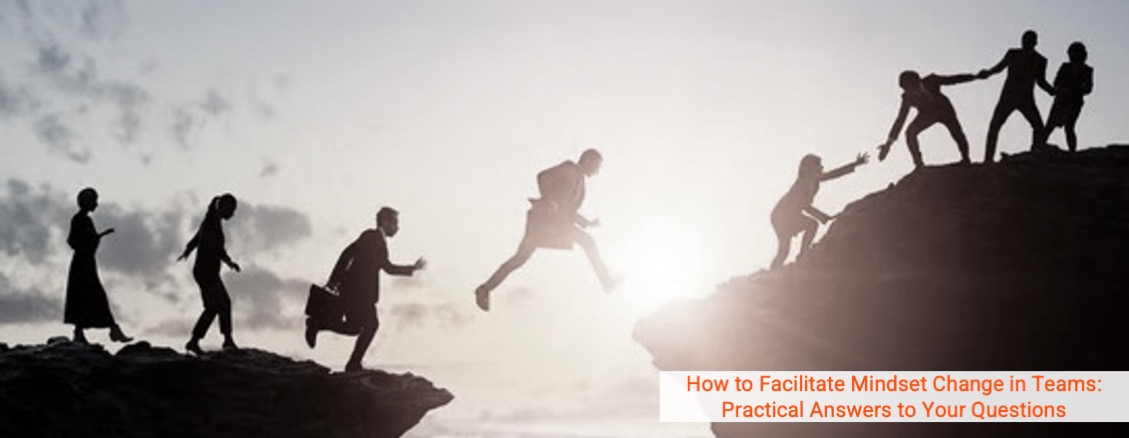In this article, you’ll discover actionable strategies and creative exercises to help your team shift from a fixed to a growth mindset, based on real questions from readers, experience and proven research.
Teams that embrace a growth mindset adapt faster, innovate more, and recover from setbacks with greater resilience. Facilitating this shift isn’t just about theory, it’s about practical actions that create lasting change in how teams learn, collaborate, and succeed.
Most attempts at mindset change fail fast because they rely on one-off workshops or motivational talks. Real transformation requires ongoing rituals, leadership support, and a culture that celebrates learning from failure, not just success.
Who Needs a Mindset Workshop?
Let’s clarify who can benefit most from a mindset change workshop:
- Project Managers: To lead diverse teams and drive adaptability.
- Department Managers: To build a culture of continuous learning.
- Team Leads: To inspire teams to see challenges as opportunities.
- Scrum Masters: To integrate mindset principles into agile ceremonies.
- Transformation Leads and/or Champions: To support change and innovation initiatives.
Remember: “Mindset change is everyone’s business—not just HR’s.”
Why Is It Important to Celebrate Small Failures?
Failure is often seen as negative, but in reality, it’s a powerful source of learning. By celebrating small failures, teams can:
- Normalize mistakes: Reducing fear of failure leads to more openness and innovation.
- Encourage calculated risk taking: A culture that accepts failure motivates people to try new ideas.
- Accelerate learning: Reflecting on mistakes helps teams quickly identify what works and what doesn’t.
- Strengthen team cohesion: Shared celebrations of failure build solidarity and trust.
Remember: “Every failure is a lesson in disguise.”
Clarification: I am not encouraging and do not want to see you failing on projects or strategic initiatives. However, micro and mini failures are our focus here: trial and error, inspect and adapt.
10 Unique & Unorthodox Ways to Celebrate Failure in a Team Setting
- Hold an Idea Funeral
Eulogize failed ideas or projects, sharing lessons learned and focusing on both the merits and reasons for failure. - Create a Fail Wall
Set up a space where team members post failures on colorful notes, honoring innovative thinking. - Give a Heroic Failure Award
Recognize those who take ambitious risks, even if they don’t succeed. - Host “F— Up Nights”
Organize events where team members share failure stories, followed by Q&A. - Celebrate with Wine and Cheese
Throw small parties to acknowledge failures in a lighthearted way. - Hold Failure Parties
Special parties to recognize learning opportunities from failure. - Use Beer or Champagne
Celebrate unsuccessful projects with drinks, treating them as learning moments.(But Ciprian, is similar to 5! This is for the Beer lovers 🙂) - Establish a “Church of Fail”
Monthly ritual where employees confess mistakes and receive applause. - Create a Public Kudos Board
Space for team members to appreciate each other’s efforts, including failed ones. - Incorporate Failure Celebrations in Agile Ceremonies
Discuss failures in retrospectives and reviews to normalize mistakes.
Remember: “Celebrate learning, not just winning.”
Best Practices for Facilitating Mindset Change in Teams
If you want to organize a mindset workshop, address these key topics:
- Fixed vs. Growth Mindset: Explore the differences and their impact.
- The Science of Brain Plasticity: Show how learning and effort change the brain.
- Embracing Failure as a Learning Opportunity: Use activities like “Failure Celebration.”
- Constructive Feedback Techniques: Teach methods for growth focused feedback.
- The Power of “Yet”: Introduce the “Yet” phrase to transform limiting beliefs.
- Developing a Culture of Continuous Learning: Discuss ongoing development strategies.
- Overcoming Barriers to Change: Use exercises like “Barrier Breakthrough.”
- Building Team Resilience: Activities to strengthen bounce back ability.
- Empathy and Perspective Taking: Exercises for seeing different viewpoints.
- Creating a Personal Growth Plan: Guide actionable steps for improvement.
Remember: “Growth is a process, not a one-time event.”
Additional Resources
- TED Talk: Carol Dweck – The power of believing that you can improve
- Book Review: Mindset – How to overcome project obstacles by changing your mindset
- Why Do Agile Transformations Fail? Unpacking Cultural Clashes and the Role of Psychological Safety
If you want to read more, the State of Organizations 2023 report by McKinsey discusses the importance of a strong learning culture in organizations and highlights the link between learning, adaptability, and organizational success.
Final thoughts: this article is designed as a practical response to your questions and I hope it offers inspiration or a solid starting point for organizing workshops or implementing mindset principles in your team.
Remember: “Mindset change starts with one step and the courage to keep going.”


0 Comments